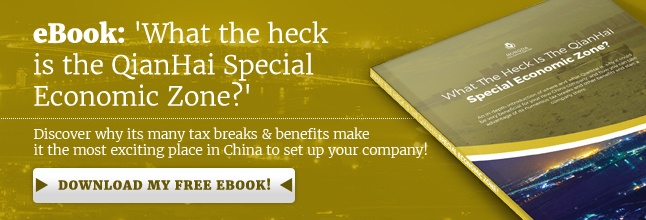It's Friday again and time for another Hongda Business Services Roundup. It has been a really busy week for us all, but I've had some time to publish some new posts and this week we will take a look at why QianHai is the best place for foreign startups, I'll share some details about Hongda's open source China business library, listen to a podcast on the state of e-commerce in China and see what China is doing to contain its technology bubble.
This week's posts cover:
-
Thinking of starting a business in China? Use these 11 free resources!
-
China moves to contain technology bubble
-
5 Surprising Benefits Of QianHai For Foreign Start Ups
-
Has E-commerce in China Reached Its Midlife Crisis?
Let's get right to it!
1) Thinking of starting a business in China? Use these 11 free resources!

Over the many years since I helped establish our humble company in good 'old' Shenzhen, I have had countless dealings with foreign professionals from all over the world looking to get a foothold into the Chinese market.
Shenzhen is an excellent business choice for a number of reasons, but doing business in China on the whole is still a relatively intimidating prospect for most foreign business people trying to get a better feel for the lay of the land.
There are so many things that one needs to take into consideration such as the location, type of business entity to incorporate, accounting and taxes, visas, compliance with the law and then some. Navigating all of this in an environment that is completely new is something that we all find daunting, and new arrivals thinking of starting a business in China could certainly do with a little help along the way.
With that in mind I would like to introduce you all to our 'Doing Business in China/Hong Kong resource library'. In this post I will briefly outline 11 free resources, what they cover, how they will benefit you and how you can go about downloading them. Here's to your future business success in China!
>>>Tweet these resources to your followers<<<
2) China moves to contain technology bubble

China’s securities regulator is barring companies from selling new shares to fund investments in non-core businesses such as internet finance, online gaming and virtual reality, in a bid to head off a speculative bubble, according to local media.
As China's economic slowdown has slammed traditional industries such as manufacturing and construction, investors have piled into sunrise industries including technology, finance and media.
In a bid to renew their fortunes and boost stock prices, listed companies in declining sectors have made abrupt shifts into new business lines, often signalling them with eye-catching name changes designed to capture investor interest.
The China Securities Regulatory Commission will no longer approve private share placements by companies in traditional industries if the purpose of the fundraising is to invest in "virtual" sectors outside the company's core business, Caixin, a respected business news website, reported on Wednesday, citing an unnamed person close to regulators. The CSRC will also tighten approvals of mergers and acquisitions where a traditional company targets these sectors.
3) 5 Surprising Benefits Of QianHai For Foreign Start Ups

China is a huge place, and while we're mostly aware of the many benefits that it offers as a country, such as lower cost manufacturing, position in the heart of Asia, and excellent infrastructure, there are specific special economic zones which offer their own distinct financial, tax, investment, and infrastructural benefits to foreign companies.
One such zone is the QianHai Special Economic Zone in the West of Shenzhen in Guangdong's PRD. This is a new zone that will not be fully operational until 2020, but it is open for business now and there are 5 surprising benefits of QianHai that foreign start ups and companies seeking a home in China aught to be aware of.
Get an in-depth view of QianHai and its benefits to YOU by downloading your free copy of our eBook: "What The Heck Is The QianHai Special Economic Zone?" here.
Discover the 5 surprising benefits here...
>>>Send this post into the Twittersphere!<<<
4) Has E-commerce in China Reached Its Midlife Crisis?
China has the most Internet users of any country. And, it’s the world’s largest and fastest-growing e-commerce market. But as penetration rises in high-tier cities like Beijing and Shanghai, it’s getting harder for companies to find new growth opportunities.
In this podcast, Nick Leung speaks with Kevin Wang and Chenan Xia about a new report that takes a closer look at emerging growth opportunities in China’s e-commerce market.
Please let us know about any of your thoughts regarding some of the topics we recapped this week in the comments below, or let us know about any other topics you'd like for us to cover.
Hope that you all have a very relaxing weekend and that you catch us again next week for another roundup of all the posts and news that matters in our world!







